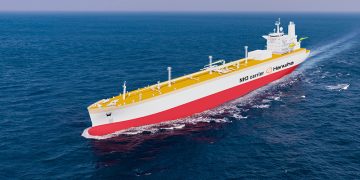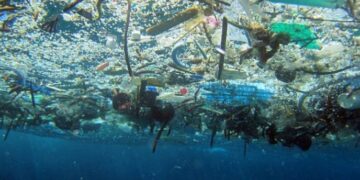ECSA and MEP Wim van de Camp yesterday organised a seminar in the European Parliament to discuss the IMO initial GHG emissions reduction strategy for shipping. The initial strategy was adopted in the 72nd session of the Marine Environment Protection Committee of the IMO in April this year.
The initial IMO strategy proposes a reduction in GHG emissions form international shipping by at least 50% by 2050 compared to 2008, and at the same time it will pursue efforts towards phasing them out entirely.
[smlsubform prepend=”GET THE SAFETY4SEA IN YOUR INBOX!” showname=false emailtxt=”” emailholder=”Enter your email address” showsubmit=true submittxt=”Submit” jsthanks=false thankyou=”Thank you for subscribing to our mailing list”]
Edmund Hughes, Head Air Pollution and Energy Efficiency, IMO, highlighted the complex negotiations in order to reach the agreement. He noted that “some Member States of the IMO were saying that in 2050 due to climate change they will literally not exist anymore, as they are small island states.”
From his side, ECSA Secretary General Martin Dorsman stated:
The shipping industry will no doubt face many challenges in reaching this target. A one size fits all approach will not be feasible and the shipping industry needs support, especially on the funding side and the regulatory side to remove barriers to innovation. The whole European maritime cluster is in an excellent position to meet the challenges and make use of the opportunities. And one thing is certain, we are on the road towards full decarbonisation and there is no turning back.
Moreover, Karin Jacobs, Senior Adviser Maritime Shipping, the Dutch Ministry of Infrastructure and Water management, highlighted the importance of the Netherlands as one of the pro-active countries during the negotiations. Karin Jacobs noted that in The Netherlands they are drafting a ‘Green Deal’ for the shipping sector, with GHG reduction measures for all the stakeholders to implement in the coming years.
All the panelists from the European Commission to companies agreed that the whole maritime chain should be ensuring GHG emissions reduction from ships, including ports, shipbuilding sector among others.
Recently, Members of the European Parliament and other stakeholders have been briefed about the Initial IMO Strategy on Reduction of GHG emissions from ships, which was adopted in April. Moreover, the measures that may be taken to implement the initial strategy, including possible short term measures, were describe






























































